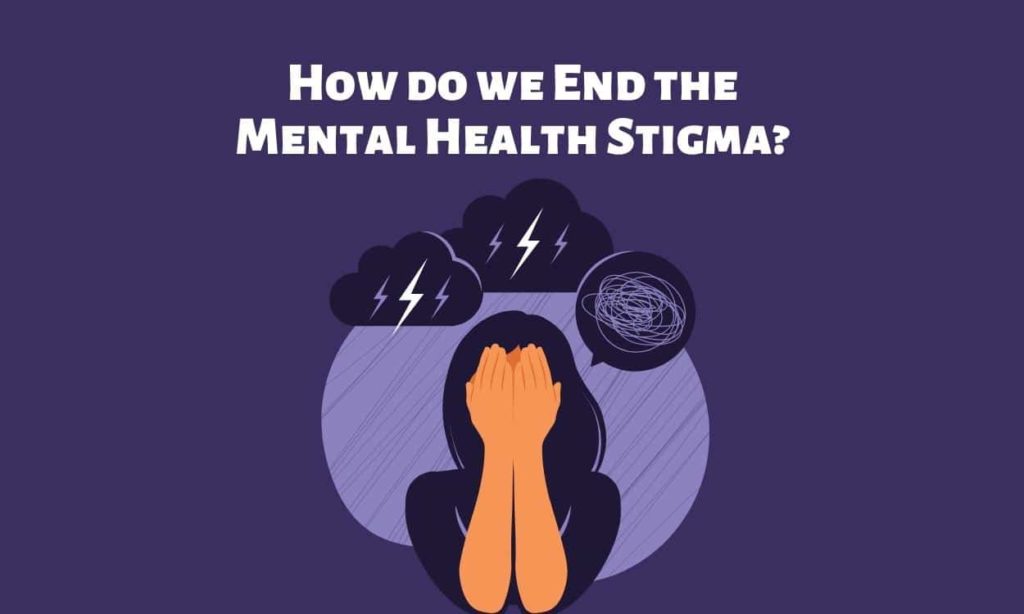Unfortunately, mental health stigma leads to isolation, worsening of symptoms, and obstacles to people getting available care. The stigma surrounding mental health can also increase the risk of suicidal thoughts or behaviors.
Breaking down social stigma and negative attitudes at every opportunity is critical to help reduce mental health burdens on an individual level and at a societal level.
What is Mental Health?
Mental health is a big term. The term refers to our emotional, cognitive, and behavioral well-being. Your mental health is how you think, feel and act.
Mental health can also be used to describe the absence of a mental health disorder.
Even if you don’t realize it, your mental well-being affects your relationships, physical health, and function in your daily life.
Unfortunately, having disruptions in your mental health can lead to problems with functionality, relationship issues, and physical health complications.
In the U.S., it’s estimated that nearly 1 in 5 adults experience problems with mental health annually. In 2017, more than 11 million adults in the United States had severe psychological conditions, based on the National Institute of Mental Health.
Nearly everyone has some risk factors for developing a psychological disorder or mental illness. These are the primary causes of disability in the U.S. and developed countries.
Key facts about mental health include:
- Mental health is as important as your physical health when it comes to your overall well-being and your quality of life.
- Your mental health can change over time. Not getting treatment can make mental health problems worse.
- More than 50% of people will be diagnosed with a mental disorder or mental illness at some point in their life, and 1 in 5 will experience a mental illness in any given year in America.
- Around 1 in 25 Americans have a serious mental illness such as bipolar disorder, schizophrenia, or major depression.
- There is not one single cause for mental illness. Instead, multiple factors can contribute. For example, adverse experiences in early life, chronic medical conditions, or chemical imbalances in the brain may contribute. Contributors can also include using drugs or alcohol or feelings of loneliness and isolation.
- When you have a mental health disorder, you’re more likely to have physical health challenges.
Common Mental Health Disorders
The most common psychiatric disorders are anxiety disorders, mood disorders, and schizophrenia disorders.
Anxiety Disorders
Anxiety disorders are the most common type of mental health condition, according to the Anxiety and Depression Association of America. People with anxiety disorders may have a generalized anxiety disorder or GAD.
- GAD leads to excessive worry affecting everyday life. Someone with a generalized anxiety disorder might experience physical symptoms like tense muscles, fatigue, or restlessness.
- Panic disorders are another type of anxiety disorder. Panic attacks characterize a panic disorder. Panic attacks include overwhelming and sudden onset of terror or an imminent sense of death or disaster.
- Phobias are disproportionate personal fears of objects, settings, or animals.
- Obsessive-compulsive disorder or OCD leads someone to experience ongoing distressing thoughts and urges to engage in certain actions to alleviate their distress.
- Post-traumatic stress disorder can occur after experiencing a deeply terrifying or traumatic event.
Mood Disorders
Mood disorders are also known as affective or depressive illnesses.
Major depression is one type of mood disorder. Individuals with depression will constantly experience low moods and loss of things they once enjoyed.
Other mood disorders include bipolar disorder and seasonal affective disorder.
Schizophrenia Disorders
Schizophrenia is a serious, complex condition with much ongoing mental illness research to understand.
There are what are called negative and positive symptoms in individuals with schizophrenia.
Positive symptoms are hallucinations and delusions, according to the American Psychiatric Association. Negative symptoms include a flat mood, lack of motivation, or general withdrawal.
Why is There a Mental Health Stigma?
More than half of people with a disorder don’t get mental health services or mental health care. Private and public mental health stigma is a big reason for this. There is general stigma and even discrimination and prejudice against people with a mental illness, leading many to avoid mental health treatment.
- Public or social stigma involves the attitudes that others have about psychiatric disorders and the people who have them.
- Self-stigma relates to the internal sense of shame or negative beliefs or attitudes you might have about yourself or your condition, compared to public stigma.
- There’s a third term—institutional stigma. This is a systemic stigma, where organizations and government policies, whether intentionally or unintentionally, limit the available opportunities for people with a psychiatric illness.
The effects of stigma include stereotypes and prejudices, or discrimination.
- Stereotypes include the misconception that people with a mental illness are dangerous or unpredictable. They may consist of generally negative attitudes toward people with a psychiatric disorder. They could be seen as having a character weakness or bad character, which we wouldn’t associate with a physical condition.
- Discrimination or prejudices might include the health care system providing a lower standard of care to someone with a psychiatric disorder, or not giving them a professional opportunity.
- When you face stigma or discrimination, along with it being a barrier to getting treatment, it can lower your self-esteem, increase your psychiatric symptoms and reduce your sense of hope. You might experience problems at work or in relationships.
Social isolation, fewer opportunities, bullying or harassment, and even physical violence can occur because of stigma.
There are even instances where people experience mental illness stigma from health care providers and health care professionals, so they might not get treatment for physical health conditions. Health insurance may not cover treatments for mental health care in the same way as primary care or other types of physical medical care.
How Can We Work to Reduce the Mental Illness Stigma?
One way that the existence of stigma about mental health issues is eliminated is that more people are talking openly about their struggles and experiences. This includes high-profile people and celebrities.
When we can look at well-known and successful people and see that they also struggle with their psychological health, it reduces some of the shame we might feel about ourselves.
Ways that you can work to reduce the types of stigma individually include:
- Get help yourself. If you’re dealing with symptoms, make sure that you seek treatment. Don’t let a fear of how you’ll be perceived or labeled stop you from getting the treatment you need. Psychiatric conditions can be progressive, meaning they get worse without treatment. When you receive professional treatment for any medical condition, it can help every part of your life.
- When you get counseling and educate yourself about mental illnesses, it can help you stop judging yourself and improve your self-esteem. Education is key, as is making use of effective treatments. You can also encourage your loved ones to learn more about mental illness. Greater understanding by family and friends can be invaluable when you’re dealing with a psychiatric condition.
- Remember that you are not your illness. Rather than saying something like “I’m depressed,” you can say, “I have depression.” This externalizes your condition, like any medical disorder or disease should be. You can live an empowered life if you remember that you are not your mental illness.
- Words do matter, and we should all work on being conscious of language and how it affects how we think about ourselves and how others feel. The words we choose to use can alter the impact of stigma.
- If you’re comfortable talking openly about your mental health, do so. You can also speak out against stigma, perhaps on social media or during a related event. Sharing personal stories is a powerful tool against mental illness stigma.
Small steps can ultimately make a big difference in eliminating the stigma surrounding our mental health. There are benefits when we all take steps to change public attitudes about people with mental health disorders.
We can reduce discrimination against people and empower ourselves as well. We can all create our own anti-stigma campaign in social activities and interactions with others.
If you’re ready to stop letting mental illness-related public stigma stand in your way and empower yourself through treatment, please reach out to the Mental Health Center of San Diego at (858) 258-9883 to learn more.















